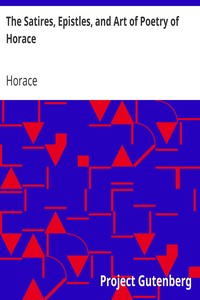The Satires, Epistles, and Art of Poetry of Horace by Horace
"The Satires, Epistles, and Art of Poetry of Horace" by Horace is a collection of Roman satirical poetry likely written in the 1st century BC. This work presents Horace’s reflections on various themes, including human nature, happiness, morality, and the art of writing. The collection is known for its wit and deep understanding of social dynamics, showcasing Horace's keen observations of both personal and societal behaviors. The opening of the text introduces
commentary on the nature of contentment and the universal tendency to envy others. Horace engages in a dialogue with his patron Maecenas, pondering why individuals seem perpetually dissatisfied with their own lives, often yearning for the fortunes of others. He reflects on contrasting lifestyles—from soldiers to merchants—and critiques the folly in such discontent, advocating instead for an appreciation of what one has. This introductory satire sets the tone for subsequent explorations of virtue, vice, and the complex web of human interaction, underscoring Horace's dual role as both observer and commentator on the human condition. (This is an automatically generated summary.)
Read now or download (free!)
| Choose how to read this book | Url | Size | ||||
|---|---|---|---|---|---|---|
| Read online (web) | https://sendtokindle.compellingsciencefiction.com/ebooks/5419.html.images | 330 kB | ||||
| EPUB3 (E-readers incl. Send-to-Kindle) | https://sendtokindle.compellingsciencefiction.com/ebooks/5419.epub3.images | 207 kB |
Send
to kindle email: |
|||
| EPUB (older E-readers) | https://sendtokindle.compellingsciencefiction.com/ebooks/5419.epub.images | 210 kB | ||||
| EPUB (no images, older E-readers) | https://sendtokindle.compellingsciencefiction.com/ebooks/5419.epub.noimages | 190 kB | ||||
| Kindle | https://sendtokindle.compellingsciencefiction.com/ebooks/5419.kf8.images | 436 kB | ||||
| older Kindles | https://sendtokindle.compellingsciencefiction.com/ebooks/5419.kindle.images | 390 kB | ||||
| Plain Text UTF-8 | https://sendtokindle.compellingsciencefiction.com/ebooks/5419.txt.utf-8 | 278 kB | ||||
| Download HTML (zip) | https://www.gutenberg.org/cache/epub/5419/pg5419-h.zip | 202 kB | ||||
| There may be more files related to this item. | ||||||
Similar Books
About this eBook
| Author | Horace, 66 BCE-9 BCE |
|---|---|
| Translator | Conington, John, 1825-1869 |
| Title | The Satires, Epistles, and Art of Poetry of Horace |
| Note | Reading ease score: 78.4 (7th grade). Fairly easy to read. |
| Note | Wikipedia page about this book: https: //en.wikipedia.org/wiki/Satires_(Horace) |
| Credits | Produced by David Moynihan, Charles Franks and the Online Distributed Proofreading Team |
| Language | English |
| LoC Class | PA: Language and Literatures: Classical Languages and Literature |
| Subject | Horace -- Translations into English |
| Subject | Rome -- Poetry |
| Subject | Epistolary poetry, Latin -- Translations into English |
| Subject | Verse satire, Latin -- Translations into English |
| Category | Text |
| EBook-No. | 5419 |
| Release Date | Apr 1, 2004 |
| Most Recently Updated | Dec 28, 2020 |
| Copyright Status | Public domain in the USA. |
| Downloads | 182 downloads in the last 30 days. |
| Project Gutenberg eBooks are always free! | |

